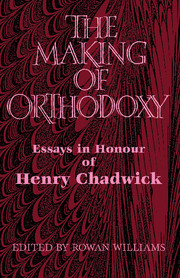Book contents
- Frontmatter
- Contents
- Preface
- List of abbreviations
- Bibliography of Henry Chadwick
- Does it make sense to speak of pre-Nicene orthodoxy?
- ‘And I have other sheep’ – John 10:16
- Reason and the rule of faith in the second century ad
- Adam in Origen
- Panegyric, history and hagiography in Eusebius' Life of Constantine
- Matthew 28:19, Eusebius, and the lex orandi
- The achievement of orthodoxy in the fourth century ad
- Eunomius: hair-splitting dialectician or defender of the accessibility of salvation?
- Some sources used in the De Trinitate ascribed to Didymus the Blind
- The rhetorical schools and their influence on patristic exegesis
- Pelagianism in the East
- The legacy of Pelagius: orthodoxy, heresy and conciliation
- Augustine and millenarianism
- Divine simplicity as a problem for orthodoxy
- The origins of monasticism
- Artistic idiom and doctrinal development
- Index of modern names
- Index of ancient and medieval names
- Index of sources
Pelagianism in the East
Published online by Cambridge University Press: 08 October 2009
- Frontmatter
- Contents
- Preface
- List of abbreviations
- Bibliography of Henry Chadwick
- Does it make sense to speak of pre-Nicene orthodoxy?
- ‘And I have other sheep’ – John 10:16
- Reason and the rule of faith in the second century ad
- Adam in Origen
- Panegyric, history and hagiography in Eusebius' Life of Constantine
- Matthew 28:19, Eusebius, and the lex orandi
- The achievement of orthodoxy in the fourth century ad
- Eunomius: hair-splitting dialectician or defender of the accessibility of salvation?
- Some sources used in the De Trinitate ascribed to Didymus the Blind
- The rhetorical schools and their influence on patristic exegesis
- Pelagianism in the East
- The legacy of Pelagius: orthodoxy, heresy and conciliation
- Augustine and millenarianism
- Divine simplicity as a problem for orthodoxy
- The origins of monasticism
- Artistic idiom and doctrinal development
- Index of modern names
- Index of ancient and medieval names
- Index of sources
Summary
Church councils at any level are improbable organs of the Holy Ghost, subject, as they are, to the same failings and mischances as beset annual general meetings of amateur dramatic societies, the proceedings of Faculty Boards and even more august assemblies. They are composed of the few who speak much, and the many who sit silent save when roused to chorus approval or outrage. When they meet, some members will turn up late; most will have only an imperfect understanding of the business; and none will remember what they collectively did at the meeting, till the minutes are later circulated. Indeed ‘remember’ is too strong a word, since the chairman and secretary will have drawn up the record and decreed a corporate memory of what was said and done.
The Council of Ephesus (ad 431) is an excellent example of the genus at its worst. It was, effectively, run by the bishop of Alexandria, Cyril, in the absence of a substantial portion of the membership which turned up late and set up its own assembly; the Roman delegates, whose presence validated Cyril's assembly as the genuine Ecumenical Council, were only very badly informed about the question of Nestorius which was the main business; and the subsequent accounts of the proceedings were, at least partly, edited by Cyril who veiled, so far as he could, some damaging items.
- Type
- Chapter
- Information
- The Making of OrthodoxyEssays in Honour of Henry Chadwick, pp. 200 - 213Publisher: Cambridge University PressPrint publication year: 1989
- 21
- Cited by



